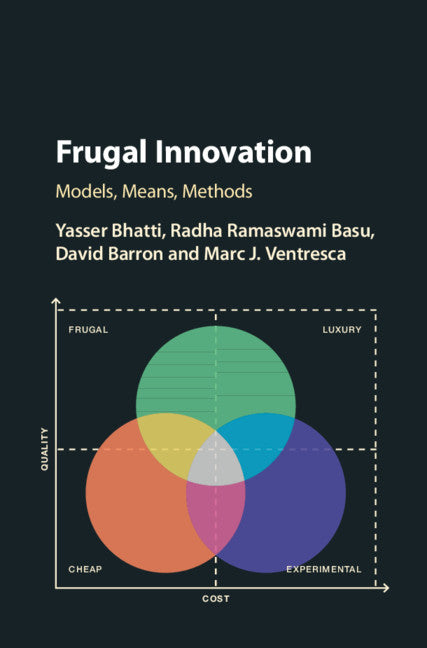Freshly Printed - allow 8 days lead
Couldn't load pickup availability
Frugal Innovation
Models, Means, Methods
Outlines a new theory of frugal innovation and provides a set of practical tools to support implementation.
Yasser Bhatti (Author), Radha Ramaswami Basu (Author), David Barron (Author), Marc J. Ventresca (Author)
9781107188976, Cambridge University Press
Hardback, published 15 November 2018
336 pages, 22 b/w illus. 36 tables
23.5 x 15.6 x 1.9 cm, 0.68 kg
'Taken as a whole, the book provides some deep insights into frugal innovation with the help of models and frameworks. It also provides a means for academics and practitioners to gain an understanding of frugal innovation with some prevalent cases. The book serves as a useful primer for anyone aspiring to research this area, and its illustration of innovation issues using various examples will be helpful for scholars.' Mokter Hossain, R&D Management
In light of growing discourse on 'frugal innovation', this book offers novel approaches to innovation based on extensive empirical research. The study complements a decade of scholarly attention on frugal innovation by taking a research-based approach to innovation in resource-scarce and complex institutional contexts. The findings suggest that concepts such as frugal, reverse, jugaad, social, grassroots and inclusive innovation in fact represent heterogeneous assemblies of innovation for social, environmental and economic value. The conceptual framework invites attention to more plural sources and elements in the study of models of innovation to inspire further research in the fields of strategy, innovation, entrepreneurship, economic sociology and development studies. The design framework offers models, metrics and competencies for practitioners and policymakers to identify, evaluate and design frugal innovations. The comprehensive view of frugal innovation demonstrates how firms can implement globally competitive strategies by pursuing innovation for humanity to improve lives for everyone, everywhere.
Part I. Models of Frugal Innovation: 1. Outline of the context, literature and methodology
2. Conceptualising innovation – Model 1
3. Conceptualising innovation under constraints – Model 2
Part II. Towards a Theory of Frugal Innovation: 4. Integrative results and theory development
5. Test of models using secondary cases
6. Emerging concepts in innovation
7. Implications for research, practice and policy
Part III. Tools for Practice and Research: Appendix A. Toolkit to identify frugal innovations
Appendix B. Core competencies from the frugal innovation lab
Appendix C. Detailed research methodology and design
References
Select Bibliography.
Subject Areas: Entrepreneurship [KJH], Business innovation [KJD], Business & management [KJ]


